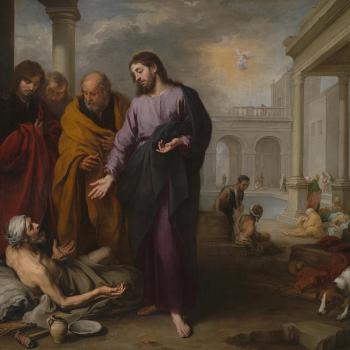 In his famous essay, “Supernatural Horror in Literature,” H.P. Lovecraft began his study of weird and supernatural fiction with the observation that: “The oldest and strongest emotion of mankind is fear, and the oldest and strongest kind of fear is fear of the unknown.”
In his famous essay, “Supernatural Horror in Literature,” H.P. Lovecraft began his study of weird and supernatural fiction with the observation that: “The oldest and strongest emotion of mankind is fear, and the oldest and strongest kind of fear is fear of the unknown.”
That which is unknown is both frightening and awe-inspiring. When we are alone in a dark room and feel the presence of some unknown person looking at us from behind, we can feel our heart pace, our adrenaline rush and spike, as our senses become more acute and we stand still, waiting to react to what happens next. As thrill seekers know, such feelings can be a kind of draw, bringing us to a heightened awareness to our surroundings, perceiving the world in a way which transcends our normal experience with it, making us therefore seek out more and more such experiences as we find greatness in the midst of such fear.
From theme parks and movies, to books and ghost stories beside a campfire, people are drawn in to thrill rides and horror stories. They come to know that fear can be awful, but it can also be awe-full; what is great and unknown comes to us as an immediate threat but also as a thing of great potential for our good. We fear the danger, and yet, we welcome the potential which lies beyond that threat. We fear the unknown and yet we, in a strange way, often grow to love that which we fear; certainly, we do not grow to love all kinds of fear, and different people will be attracted to different kinds of fear and the thrill such fear brings with it, but we do find ourselves drawn in and attracted all kinds of things which fill us with such awe-full dread.
There is nothing greater, nothing more dreadful, nothing more beautiful, nothing more awe-inspiring, nothing more horrifying than the presence of God. Where God is, we experience a multitude of sensations; his actions reveal his presence, but beyond that presence lies the extreme Unknown God who can never be comprehended by us, and so in that incomprehension, we find fear and loved mixed together. When we try to sanitize God, to dismiss the transcendent mystery, we lose God, and with it, lose our reason to love and be attracted to God. He is the Unknown who is wild and uncontrollable, who loves us with a burning fire that threatens our very being and yet – and yet like moths to a flame, when we feel that presence, when we sense that fiery greatness, we cannot help but go forth into that presence and let it do to us all that it will.
We take in the experience, finding it transforming is, making us like drunkards. Our minds fail us as we do not comprehend what we are even doing. Yet, in the midst of such dumbfoundedness, we find ourselves filled with the spirit, full of joy and excitement, and everything outside the space within the presence of God we occupy finds its relevance minimalized if not entirely annihilated.
This two-fold fear and sense of awe that occurs in the presence of God can be found throughout Scripture. Jacob, on his way to Haran, stopped at a place and dreamed his famous dream of the ladder which goes up to heaven:
Then Jacob awoke from his sleep and said, “Surely the LORD is in this place; and I did not know it.” And he was afraid, and said, “How awesome is this place! This is none other than the house of God, and this is the gate of heaven” (Gen. 28:16-17 RSV).
Jacob had encountered God and so he was afraid, afraid not that God sought him undo harm out of spite, but the fear comes to those who encounters the tremendous presence of God. Those who know and love God will awaken to that presence and know it in their life, feeling the awe and dread with them always. It is not an impure fear out which comes out of sin, but the pure and holy fear which enlivens those who experience it:
Fear is twofold; one is pure, the other impure. That which is pre-eminently fear of punishment on account of offences committed is impure, for it is sin which gives rise to it. It will not last for ever, for when the sin is obliterated through repentance it too will disappear. Pure fear, on the other hand, is always present even apart from remorse for offences committed. Such fear will never cease to exist, because it is somehow rooted essentially by God in creation and makes clear to everyone His awe-inspiring nature, which transcends all kingship and power.[1]
The greatness of the Unknown God makes us afraid, but that fear itself makes us realize God’s greatness. We cannot put our minds around him. We cannot capture and seize him in our thoughts. We cannot control him. We can only lift our hearts to him in prayer, and indeed, that is what his dreaded presence leads us to do. Even when we feel isolated and in exile from his presence thanks to our sins, that awe can attract us and lead us to lift our hearts to him, and with that great and holy fear, cry out to God:
For thou hast put the fear of thee in our hearts in order that we should call upon thy name; and we will praise thee in our exile, for we have put away from our hearts all the iniquity of our fathers who sinned before thee (Bar 3:7 RSV)
Of course, if we have sinned, if we have turned out back from the great and wild God, the God who is the living flame of love which eats away at all that is not love, then we shall fear and dread him not only with the pure and holy love, but with the dread which our sins make us feel while in his presence. Thus, St. John Chrysostom could talk about the fear which is to be found in churches:
Our churches are not like that; they are truly frightening and filled with fear. God’s presence makes a place frightening because he has the power over life and death. In our churches we have countless discourses on eternal punishments, on rivers of fire, on the venomous worm, on bonds that cannot burst, on exterior darkness.[2]
When we find ourselves in a holy place because the presence of God is there, we might want to bolt because of our own sense of our own unholiness; we will fear and yet even then, the greatness of God which transcends us will make us also want to stay; we will be attracted even in our shame; we will be afraid of the consequences of our sins, even as we will be filled with awe in the grandeur of his presence.
This is how and why God reaches out to is in a new fashion; he comes to us face to face in the God-man Jesus Christ, and not just in any form, but in the monstrous form of the wounded, entirely disfigured Jesus on the cross. He draws out of our fear our love, a love which will make us truly appreciate and engage God in his monstrosity. We see the full effects of the sins of the world on the human condition; beaten to a bloody pulp, hanging loose and without strength, the glory of God reveals to us the ultimate in horror where the transcendence finds itself one with the lowest of the low, with the humble beaten down man on the cross. God is still there; God is still great, and we can and will still the fear of God within us but it has become transformed. We do not know what it means. We feel joy and sorrow, gladness and shame, even as the fear remains. What is it God will do? He remains ever uncontrollable. We must await God’s next response. “For the soul is joyous at God’s visitation and mercy, but at the same time is in awe and trepidation at His presence because it is guilty of so many sins.”[3]
[Image=By Michal Klajban (Hikingisgood.com) (Own work) [CC BY-SA 4.0 (https://creativecommons.org/licenses/by-sa/4.0)], via Wikimedia Commons]
[1] St. Maximos the Confessor, “First Century of Various Texts” in The Philokalia. The Complete Text. Volume Two trans. and ed. G.E.H. Palmer, Philip Sherrard and Kallistos Ware (London: Faber and Faber, 1990), 179-180.
[2] St. John Chrysostom, Discourses Against Judaizing Christians. Trans. Paul W. Harkins (Washington, DC: CUA Press, 1977), 14.
[3] St. Gregory of Sinai, “On the Signs of Grace and Delusion” in The Philokalia. The Complete Text. Volume Four. trans. and ed. G.E.H. Palmer, Philip Sherrard and Kallistos Ware (London: Faber and Faber, 1995), 260.
Stay in touch! Like A Little Bit of Nothing on Facebook













